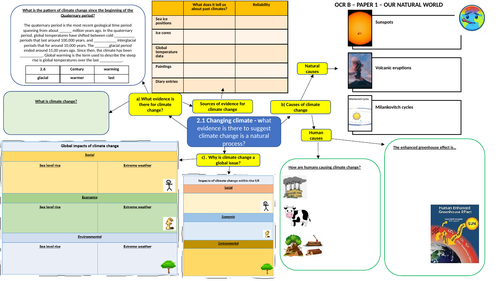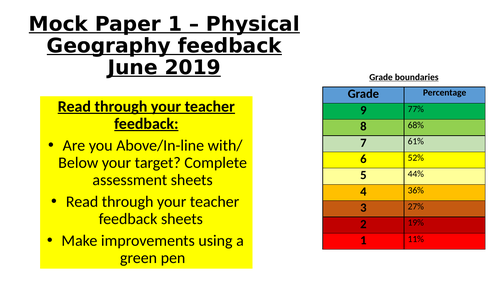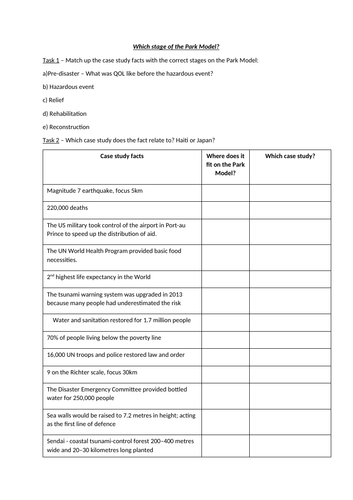
293Uploads
175k+Views
179k+Downloads
All resources

AQA Geography Nigeria NEE Case study revision sheet and lesson
A3 revision sheet covering the Nigeria section of the specification. Each section linked to the key areas of the specification.
Powerpoint runs through the content covered. Students fill in the revision sheet as the teacher runs through the powerpoint.

AQA Geography Lagos revision lesson and revision sheet
A fully resourced revision lesson covering Lagos as a NEE city.
Starter - Identify the case studies linked with the specification and add them to a World map.
Main - revision sheet to be completed using the information on the slides. I have tried to limit the amount of place specific detail for each area of the specification to 3 points so it is not too much to take in.
Revision sheet should be printed on A3 paper.

KS3 Geography - Managing flooding - Progress in Geography
Fully resourced lesson covering flood management. Fits well with the Progress in Geography book. I have included a range of different activities.

Africa - Does China want to help Africa develop? Progress in Geography
Fully resourced lesson.
Students are introduced to Ethipia and look at the impacts of the Ethiopia-Djibouti electric railway line, analysis a graph showing imports and exports from China to Africa and vice versa, they then look at peoples views on Chinas involvement in Africa.

Africa - Climate and Biomes lesson - Progress in Geography
Fully resourced lesson.
Learning Objectives.
To understand the pattern of climate zones and biomes across Africa.
To understand some of the features of the savanna biome in Africa.
Lots of activities to complete:
Students add the biomes to their map of Africa and then answer questions about countries that have these biomes in Africa.
Students then complete a climate chart and use the other two on the sheet to work out which biome it belongs to.
Students then use the deskmat to complete a mini case study of the savanna biome.

Africa- Physical features lesson - Progress in Geography
Fully resourced lesson - linked to the progress in geography book.
Starter - True or false exercise
Main - Students complete an information hunt on 6 of Africa’s physical features.
Students introduced to a map showing the distribution of resources in Africa.
Video - chidren mining in DRC
Extended writing pieces about whether or not natural resources are important to Africa.
Learning Objectives
To describe the distribution of Africa’s main physical features.
To understand the importance of natural resources to Africa.

Africa - How developed are African countries? Progress in Geography
Fully resourced lesson - including development indicators sorting task, students pick 1 development indicator and use it to create a scattergraph to see if there is a correlation and then students read different peoples views about development in Africa and then decide if they are positive or negative.
Learning Objectives.
To understand how we can measure development.
to understand the differences in levels of development across African countries
to consider different points of view about development in African countries

Africa - Stereotyping - Africa is not a country - Progress in Geography
Fully resourced lesson. Students have to write down words that they associate with Africa on a blank map and are introduced to Stereotyping.
Students then complete a map skills task.
They use gap minder to compare quality of life for two countries.
Learning Objectives
To know the meaning of stereotyping.
To know how we can challenge stereotypes of Africa.
To know the location of Africa

Africa - What are the causes of uneven development in Africa?
Fully resourced lesson.
Learning Objectives.
To understand why the world is unequal.
To understand the causes of uneven development in Africa.
To understand the opportunities for development in Africa
Starter - crossword about development indicators.
Main - reciprocal reading task using the prisoners of Geography to support in answering lesson title. Students then complete a diamond nine of the causes of uneven development in Africa and then answer the question. Scaffolding and challenge tasks included.

Africa - Desertification in the Sahel - Progress in Geography
Learning Objectives.
To identify the causes and consequences of desertification in the Sahel.
To explore solutions to desertification in the Sahel.
Fully resourced lesson.
Starter - Odd one out.
Map skills task, video on the causes of desertification, graph analysis task, table looking at the physical and human causes of desertification in the Sahel and video and comprehension task on The man that stopped the desert.

Plate Margins Fully Resourced lesson - Progress in Geography
Fully resourced lesson - What happens at plate boundaries?
Follows the Hodder Progress in Geography book.

What are Volcanoes? Fully resourced lesson - Follows Hodder Progress in Geography
A fully resourced lesson looking at volcanoes. Follows the Progress in Geography SOW.
Lesson includes:
Careers starter - Volcano blogger
Video - with questions
Volcano cross section for students to complete.
Matching task - dormant, extinct and active
Students create a table comparing the shield and composite volcanoes

Japanese Earthquake and tsunami fully resourced lesson
Fully resourced lesson about the Japanese earthquake (2011)
Double sided case study sheet with activities for students to complete.

OCB B Geography - Case study knowledge organiser - Paper 1
5 knowledge organisers covering all of the content for the nine required case studies in Paper 1, Our Natural World.
Case studies of two contrasting natural weather hazard events arising from extreme weather conditions.
A case study of a tectonic event that has been hazardous for people, including specific causes, consequences of and responses to the event.
Explore a range of social, economic and environmental impacts of climate change worldwide
Explore a range of social, economic and environmental impacts of climate change within the UK such as the impact on weather patterns, seasonal changes and changes in industry.
Case study of one coastal landscape to include the study of:
its landforms created by geomorphic processes
the geomorphic processes operating at different scales and how they are influenced by geology and climate
human activity, including management, works in combination with geomorphic processes to impact the landscape
Case study of one river basin to include the study of:
its landforms created by geomorphic processes
the geomorphic processes operating at different scales and how they are influenced by geology and climate
human activity, including management, works in combination with geomorphic processes to impact the landscape.
A case study to illustrate attempts to sustainably manage an area of tropical rainforest, such as ecotourism, at a local or regional scale.
A case study to examine one small-scale example of sustainable management in either the Antarctic or the Arctic.
A case study to examine one global example of sustainable management in either the Antarctic or the Arctic

OCR B GCSE 9-1 Changing climate revision sheet
A3 revision sheet for topic 2 ‘changing climate’, Paper 1.
Can be used alongside the CGP revision guide.

AQA GCSE Geography - Paper 1 2019 Feedback lesson
Feedback PowerPoint lesson for the Summer 2019 Paper 1 examination.
Model answers included for some questions.

OCR B Geography 9-1 Distinctive landscapes revision sheets
Three A3 revision sheets for students to complete on the distinctive landscapes section of Paper 1 - all areas of the specification covered including case studies.
They fit nicely with the textbooks and CGP revision guide.

OCR B Geography 9-1 Sustaining ecosystems revision sheets
Three A3 revision sheets for the sustaining ecosystems topic from Paper 1. All linked to the specification and case study tables included.
Can be used alongside the CGP guides.

OCR B Geography - Global hazards A3 revision sheet
2 A3 revision sheets for students to complete covering the global hazards section of Paper 1.
Can be used alongside the CGP guide.

Park Model of response - A-Level hazards
Two activities included:
Evaluation of the Park model - Students sort the statements into the advantages and disadvantages and add evidence from case studies
Park Model - which stage worksheet
Students decide what stage of the model each statement fits and which case study it comes from - Haiti or 2011 Japanese earthquake




















